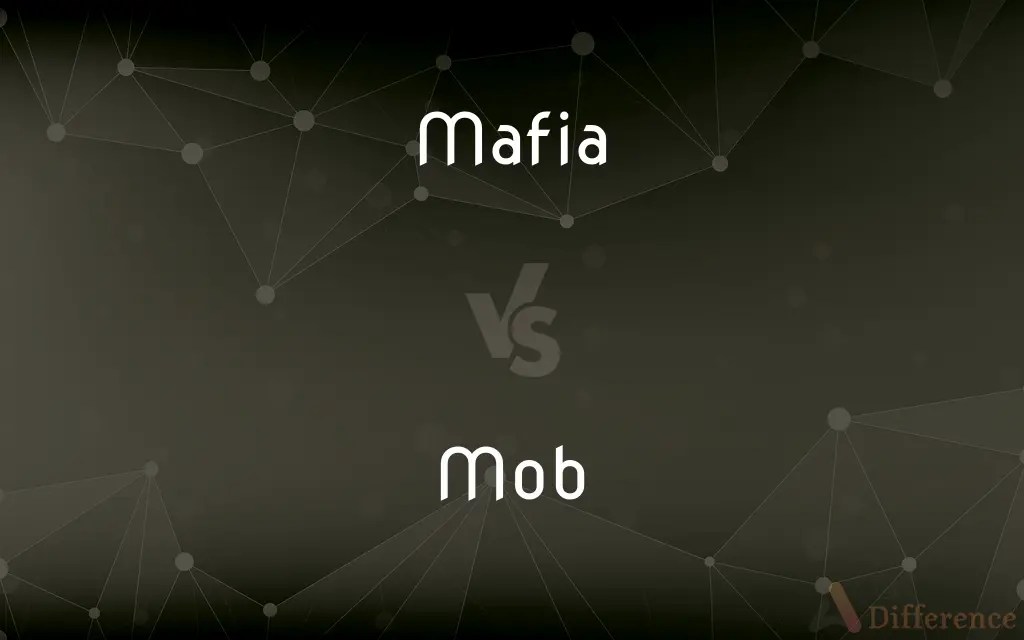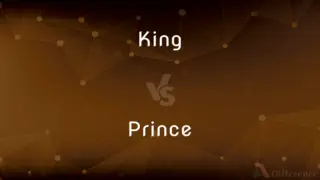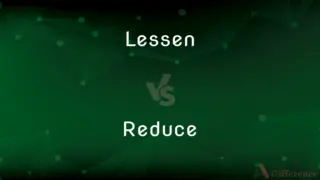Mafia vs. Mob — What's the Difference?
By Tayyaba Rehman — Updated on October 13, 2023
The Mafia refers to specific Italian or Italian-American organized crime syndicates, while "mob" is a generic term for any large group or organized crime group.

Difference Between Mafia and Mob
Table of Contents
ADVERTISEMENT
Key Differences
The term Mafia is historically rooted in Italy, particularly in Sicily, and designates organized crime groups with strict codes of conduct and hierarchical structures. The Mob, on the other hand, is a broader, colloquial term often used in American English to denote any organized crime group, not necessarily of Italian origin.
While all Mafias can be considered mobs due to their criminal nature and group dynamics, not all mobs are Mafias.
The word "Mafia" carries with it cultural, historical, and organizational connotations, especially linked to its Sicilian origins. Conversely, "mob" can describe any large group, not always criminal, but when used in the context of crime, it doesn't specify a particular ethnic or regional affiliation.
Comparison Chart
Origin
Italy, especially Sicily
General English term
Organizational Depth
Structured hierarchy, strict codes
Varies, not always structured
ADVERTISEMENT
Cultural Connotation
Primarily Italian or Italian-American
No specific cultural or ethnic connotation
Broadness of Term
Specific to certain crime syndicates
Broad, can describe any large group
Usage Context
Mostly in organized crime contexts
Can be used outside of crime contexts
Compare with Definitions
Mafia
An Italian organized crime syndicate.
The Mafia's influence spread from Italy to the U.S.
Mob
A large and often disorderly crowd. ]
Mafia
Crime families with Italian heritage.
Several Mafia families controlled various territories in New York.
Mob
A large or disorderly group of people; especially one bent on riotous or destructive action.
Mafia
A syndicate operating under a code of silence.
Breaking the Mafia's code, or omertà, is punishable by death.
Mob
(archaic) The lower classes of a community; the rabble.
Mafia
Organized crime with hierarchical structures.
The Mafia is known for its strict hierarchical orders.
Mob
(collective noun) A group of animals such as horses or cattle.
Mafia
A closed community with its own rules.
Once you're in the Mafia, it's hard to get out.
Mob
(collective noun) A group of kangaroos.
Mafia
A mafia is a type of organized crime syndicate whose primary activities are protection racketeering, arbitrating disputes between criminals, and brokering and enforcing illegal agreements and transactions. Mafias often engage in secondary activities such as gambling, loan sharking, drug-trafficking, prostitution, and fraud.
Mob
(collective noun) A flock of emus.
Mafia
A secret criminal organization operating mainly in Sicily since the early 1800s and known for its intimidation of and retribution against law enforcement officials and witnesses.
Mob
A mafia: a group that engages in organized crime.
Mafia
A secret criminal organization operating mainly in the United States and Italy and engaged in illegal activities such as gambling, drug-dealing, protection, and prostitution.
Mob
(video games) A non-player character, especially one that exists to be fought or killed to further the progression of the story or game.
Mafia
Any of various similar criminal organizations, especially when dominated by members of the same nationality.
Mob
(Australian Aboriginal) A group of Aboriginal people associated with an extended family group, clan group or wider community group, from a particular place or country.
Mafia
Often mafia(Informal) A tightly knit group of trusted associates, as of a political leader
"[He] is one of the personal mafia that [the chancellor] brought with him to Bonn" (Christian Science Monitor).
Mob
(obsolete) A promiscuous woman; a harlot or wench; a prostitute.
Mafia
A hierarchically structured secret organisation engaged in illegal activities like distribution of narcotics, gambling and extortion.
Mob
A mob cap.
Mafia
A crime syndicate.
Mob
Abbr of mobile phone
Mafia
A trusted group of associates, as of a political leader.
Mob
(transitive) To crowd around (someone), sometimes with hostility.
The fans mobbed a well-dressed couple who resembled their idols.
Mafia
An entity which attempts to control a specified arena.
Mob
(transitive) To crowd into or around a place.
The shoppers mobbed the store on the first day of the sale.
Mafia
See maffia, maffioso.
Mob
(transitive) To wrap up in, or cover with, a cowl.
Mafia
A crime syndicate in the United States; organized in families; believed to have important relations to the Sicilian Mafia
Mob
A mobcap.
Mafia
A secret terrorist group in Sicily; originally opposed tyranny but evolved into a criminal organization in the middle of the 19th century
Mob
The lower classes of a community; the populace, or the lowest part of it.
A cluster of mob were making themselves merry with their betters.
Mafia
Any tightly knit group of trusted associates
Mob
A throng; a rabble; esp., an unlawful or riotous assembly; a disorderly crowd.
The mob of gentlemen who wrote with ease.
Had every Athenian citizen been a Socrates, every Athenian assembly would still have been a mob.
Confused by brainless mobs.
Mob
To wrap up in, or cover with, a cowl.
Mob
To crowd about, as a mob, and attack or annoy; as, to mob a house or a person.
Mob
A disorderly crowd of people
Mob
A loose affiliation of gangsters in charge of organized criminal activities
Mob
An association of criminals;
Police tried to break up the gang
A pack of thieves
Mob
Press tightly together or cram;
The crowd packed the auditorium
Common Curiosities
Can "mob" refer to non-criminal groups?
Yes, "mob" can refer to any large crowd or group of people.
Where did the Mafia originate?
The Mafia has its roots in Sicily, Italy.
Is every mob a Mafia?
No, while all Mafias can be considered mobs, not all mobs are Mafias.
Is the Mafia specifically Italian?
Yes, the term "Mafia" originated from Italy, especially Sicily.
Does "mob" always refer to crime groups?
No, "mob" can refer to any large or disorderly group, though it can denote crime groups in specific contexts.
Do Mafias operate with a specific code?
Yes, Mafias are known for their codes of conduct, like "omertà."
Are Mafias only involved in illegal activities?
Primarily, though they may have legitimate front businesses.
Is "mob" an American term?
The term "mob" is used widely in American English but is understood in other English-speaking regions too.
Do Mafias and mobs always use violence?
Not always, but both can resort to violence to achieve their goals or maintain control.
Is the Mafia always of Italian descent?
While historically Italian, Mafia can refer to Italian-American crime syndicates too.
Is "mob mentality" related to crime?
Not necessarily. "Mob mentality" refers to the way individuals are influenced by their peers to act in a certain way.
What's the "Mafia's" signature code of silence?
The Mafia's code of silence is called "omertà."
How is the Mafia structured?
The Mafia is organized with a strict hierarchy and set roles.
Is a mobster always related to the Mafia?
Not always. A mobster can be a member of any organized crime group.
Can "mob" be used in a positive context?
It's neutral but can lean negative; however, it can be used neutrally, like "a mob of fans."
Share Your Discovery

Previous Comparison
King vs. Prince
Next Comparison
Lessen vs. ReduceAuthor Spotlight
Written by
Tayyaba RehmanTayyaba Rehman is a distinguished writer, currently serving as a primary contributor to askdifference.com. As a researcher in semantics and etymology, Tayyaba's passion for the complexity of languages and their distinctions has found a perfect home on the platform. Tayyaba delves into the intricacies of language, distinguishing between commonly confused words and phrases, thereby providing clarity for readers worldwide.















































